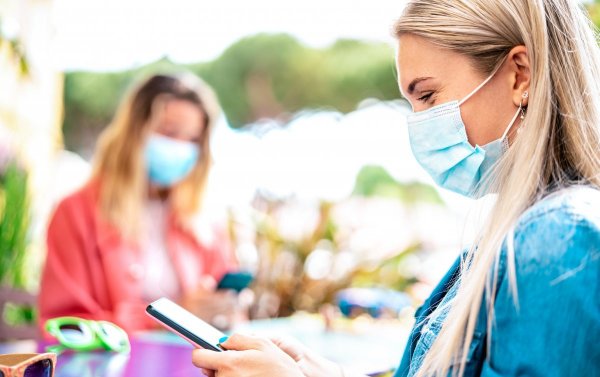Social Media: The Good, Bad, and the Ugly

The pandemic has brought awareness to the impact social media has on one’s mental health. (Image courtesy of Institutes of Energy and the Enviornment)
November 18, 2021
Social distancing and quarantine protocols have had many people spending more time alone than ever. The desire to overcome that loneliness has people turning to social media for a connection. While logging on to chat with friends can be a mood booster, spending too much time on social media can also have a negative affect on one’s mental health.
On a global scale, social media can be a way for people to share information and reach out to others facing the same challenges or issues. It can also be an effective platform to rely on information during the pandemic. This global reach has made social media a critical communication tool during the COVID-19 pandemic. Social media can also help effectively communicate health information to an audience during a health crisis.
People who are feeling lonely are more inclined to use social media to cope with lacking social contact. Social media can be used as a constructive coping strategy for adolescents who deal with anxious feelings during the COVID-19 quarantine. Contact with friends and family on social media might be a coping strategy to relieve fear, and thus has a positive effect on mental health. Social media is also used for entertainment motivations, such as games and watching funny videos, which can positively benefit mental health as well.
According to the “World Health Organization” mental health conditions are on the rise. Pandemic-related mental health challenges have impacted people differently with pandemic stress. As social media has grown, more people have started using it as a news source since the pandemic. However, the information shared on social media platforms can sometimes be inaccurate or misleading which can cause issues and problems.
The spread of potentially harmful information became so prevalent during the pandemic that many sites have started flagging and, in some cases, removing content that are not based off of facts. Despite these efforts, social media users are still bombarded with images, articles, and posts that spread misinformation and contribute to an already heightened sense of fear. The impact of this information can be extremely stressful, particularly as users try to get a handle on their own feelings connected to social issues of the past year.
For many, social media has become a lifeline to the outside world, especially as people look for ways to remain connected and entertained. For adolescents, who highly rely on social contacts with peers, the prolonged period of social isolation may have detrimental effects on their mental health.While social media can play a critical role in keeping friends and family connected, users should be aware of how longer periods of mindless scrolling can have a detrimental impact on their mental health. The pandemic provides fewer opportunities for in-person interaction, many feel less connected than they did in the pre-pandemic world, despite their intentions to use social media for more connectivity.
Social media has become a constant in our lives during the COVID-19 pandemic as we continuously toggle between the seemingly endless train of platforms. While all of these options and opportunities for connection and information may seem positive, they can also have a negative effect on mental health, particularly during a time of isolation and quarantine. Something that should be an outlet can become an oppression of sorts as we inadvertently become chained to the feed.

Raymond Amezcua • Dec 13, 2021 at 1:05 pm
Very good article. Knowing that there’s different aspects on social media is crazy.
Bushra Syed • Dec 13, 2021 at 12:57 pm
Great job Melanie! I thought your story was thought out and put together really well. Although I don’t use social media often, I’ve seen a lot of people who get addicted to it and how unhealthy it is for our mental health. Keep it up!
Avery Ngo • Dec 13, 2021 at 12:55 pm
I loved this Opinion piece. I agree that there are both good and bad aspects to social media. It has really changed the way we communicate today.
Kaylie Amaya • Dec 13, 2021 at 12:43 pm
I love how you talk about both the negative and positive things about social media.
grettle • Nov 18, 2021 at 1:00 pm
you really ate, no crumbs left
Kayla • Nov 18, 2021 at 12:51 pm
I think it is ok, and it needs a little bit more work.